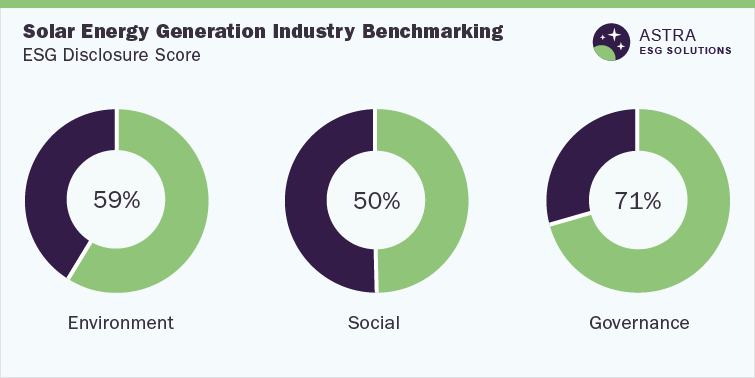The Growth of the solar energy generation industry will depend on the proactive and relentless efforts of forward-looking companies to navigate the risks posed by climate change. Current and predicted issues expected to arise due to climate change have brought a paradigm shift in the ways businesses assess risk, and plan and deploy resources. Sustainability, security compliance, safety, business growth, and innovation have become instrumental to progress toward implementing best practices in environmental, social, and governance portfolios. The trend for green, sustainable, and safe pathways is likely to pay off and help make better economic sense in the long run. Prominently, solar energy generation has garnered popularity as one of the cheapest forms of electricity and will be a solid proposition to tap potential in energy generation.

In common parlance, solar energy plays an invaluable role in boosting sustainable development energy solutions. Solar energy generation applications are likely to play a vital role in fostering an environmentally friendly energy agenda. In essence, solar panels have gained ground to generate clean power and contain the cost of electricity. To illustrate, in June 2022, the U.S. Solar Buyer Consortium announced an infusion of USD 6 billion to bolster the domestic solar panel ecosystem with the supply of around 7 GW of solar modules per year from 2024. It is worth mentioning that the Solar Energy Industries Association asserts that the U.S. installed 23.6 gigawatts of solar capacity in 2021. The federal investment tax credit, along with renewable energy credits, advanced technologies, reduced installation costs, and financing arrangements, offers promising opportunities for stakeholders to emphasize solar power as an indispensable part of the ESG goals across the U.S.
Exelon Corporation Harnesses the Potential of ESG
With environmental issues spurring governance and social practices, investors are curious to know how businesses minimize their carbon footprint. Stakeholders are responding to these trends through ESG strategies. Several companies have come to the fore to inject funds into renewable energy to propel ESG sustainability goals. For instance, the Exelon Corporation reportedly avoided 78 million metric tons of GHG emissions with its zero-carbon nuclear generation. The company witnessed 161 million MWh zero-carbon generation, around two-fold more compared to the next largest producer. In July 2022, Exelon released the 2021 Corporate Sustainability Report and noted that it poured USD 6.6 billion in energy infrastructure in 2021 and is contemplating raking in USD 29 billion from 2022 through 2025. On the environmental front, the company claims to be working to minimize impacts on biodiversity and watersheds. It has also spurred sustainability through corporate governance—assessing accountability and risk.
Understand how key industry participants like Exelon Corp., E.On S.E., and Duke Energy Corp. are understanding and mitigating ESG risks and ensuring compliance
E.ON SE at Pole Position in ESG Disclosure; Emphasizes Green Electricity
Sustainability strategies and disclosures have come on the horizon amidst ESG being tasked with the goal of decarbonizing the global economy. When it comes to ESG disclosure, E.ON SE is at the helm, followed by Exelon Corporation and Equinor ASA. It is gearing to be climate-neutral by 2040 and its corporate governance is increasingly linked to its ESG management aspects. CDP, an international association of investors that independently assesses the transparency and detail of companies’ climate reporting, lauded E.ON as a Supplier Engagement Leader in 2021. In a bid to bolster the green-power community across Europe, E.ON Home, an energy management app, was introduced in the U.K. Similarly, it claims over 10 million customers received certified green electricity products in 2021.
Incumbent players have reinforced their efforts to underpin the decarbonisation of Europe. The company contemplates investing €1 billion (around USD 1 billion) annually through 2026 to significantly boost the infusion of funds into energy networks. It is geared to foster sustainable homes, work, and lifestyles with innovative solutions, including self-generated green electricity. It aims to install approximately 5,000 new charging points through 2026. The Germany-based company plans to pour €27 billion into energy transition through 2026. Furthermore, the company has also upped investments to provide green energy to take carbon neutrality and sustainability to the next level. For instance, in April 2022, E.ON inked a deal with Solar Market to create Green Cloud to offer green energy to corporate customers across Hungary.
The competitive landscape alludes to an increased focus on ESG framework and sustainable policies from forward-looking companies, such as E.ON SE, Adani Green Energy Limited, Equinor ASA, Nextera Energy, Inc., Exelon Corporation, Duke Energy Corporation, Solaria Energía y Medio Ambiente and ReNew Wind Energy (Jath) Limited. Besides, organic and inorganic growth strategies have become pronounced, underscoring solar energy generation market share. To illustrate, in November 2022, Equinor announced the acquisition of BeGreen, a Danish solar developer, to propel the solar PV portfolio. Meanwhile, in April 2022, the Norway energy giant forayed into the Australian market through investments in RayGen to provide impetus to solar energy. In November 2022, Equinor expressed contemplation to augment investment in renewables by two-fold and that renewable energy will account for approximately 20% of the company’s investments in 2022. Amidst the trilemma of the Russia-Ukraine war, energy security, and affordability, emphasis on renewable energy sources could be a game-changer with considerable environmental upsides in solar energy generation.
Is your business one of participants to the Global Solar Energy Generation Industry? Contact us for focused consultation around ESG Investing, and help you build sustainable business practices
About Astra – ESG Solutions by Grand View Research
Astra is the Environmental, Social, and Governance (ESG) arm of Grand View Research Inc. – a global market research publishing management consulting firm.
Astra offers comprehensive ESG thematic assessment scores across diverse impact socially responsible investment topics, including both public and private companies along with intuitive dashboards. Our ESG solutions are powered by robust fundamental alternative information. Astra specializes in consulting services that equip corporates and the investment community with the in-depth ESG research and actionable insight they need to support their bottom lines and their values. We have supported our clients across diverse ESG consulting projects advisory services, including climate strategies assessment, ESG benchmarking, stakeholder engagement programs, active ownership, developing ESG investment strategies, ESG data services, build corporate sustainability reports. Astra team includes a pool of industry experts and ESG enthusiasts who possess extensive end-end ESG research and consulting experience at a global level.
For more ESG Thematic reports, please visit Astra ESG Solutions, powered by Grand View Research








